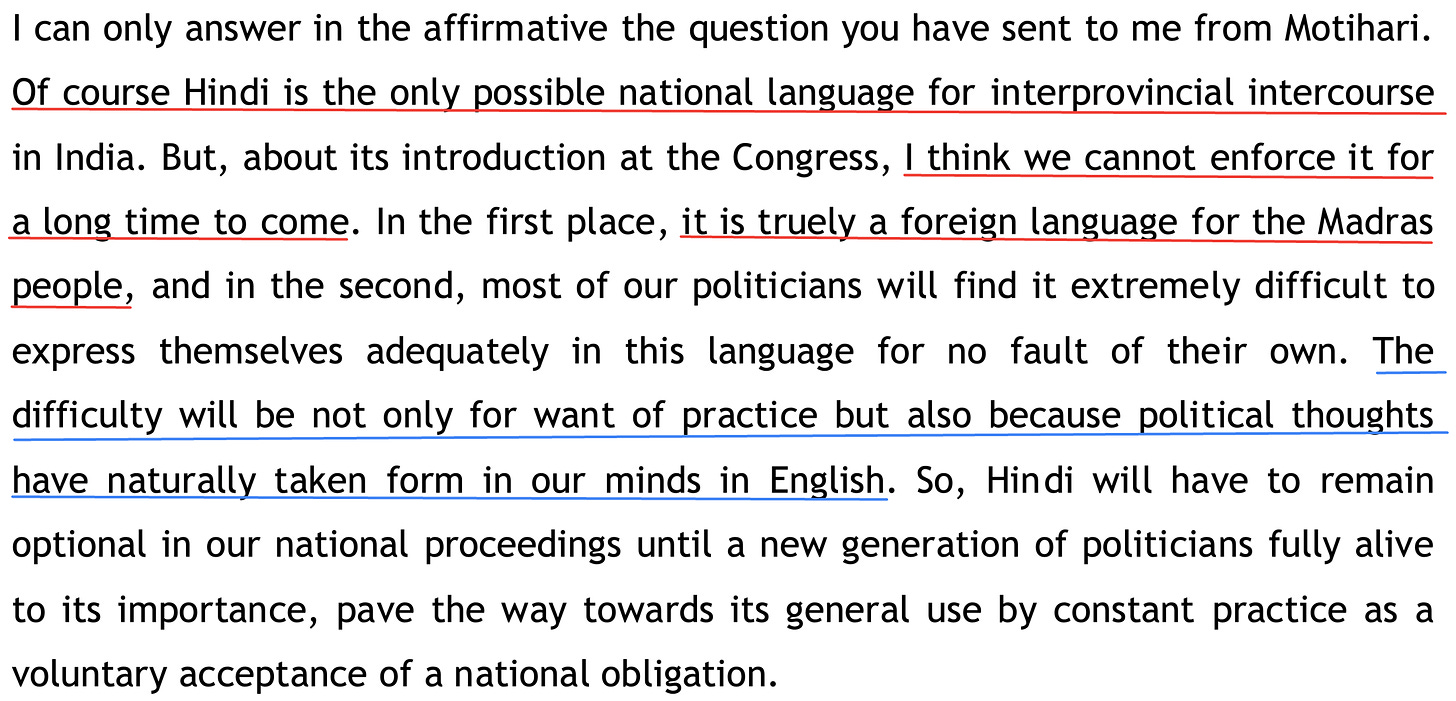The very first letter exchanged by Gandhi and Tagore is one where Gandhi asks Tagore about the status of Hindi.
Gandhi called Tagore Gurudev, and it was Tagore who first called Gandhi Mahatma. The question of language was (and is) acute for several reasons:
Indians speak a bewildering variety of languages. Some, such as my mother tongue, Tamil, are further away from Hindi than Hindi is from English.
Nevertheless, there’s this sense that a nation needs a language, and indeed, the history of nationalism in Europe was intimately tied to the development of English, French, Italian, Greek etc as national languages.
Of course, it’s not language per se as much as the printed word that matters. When Gandhi asks Tagore about Hindi being used for inter-provincial intercourse and national proceedings, he’s thinking about documents shared by office bearers and bureaucrats. Benedict Anderson on this very issue:
Tagore has an interesting response:
If you’re an Indian reading this passage, chances are your eyes will rest on the words underlined in red above. Tagore gives his grudging assent to Hindi but immediately qualifies his agreement with the caveat that people from Madras (my part of the world) will find Hindi alien. That tension remains to this day.
But in our planetary reading, it’s the words underlined in blue that matter more. Tagore says that we don’t have the language to think politically in the vernacular. Politics in the modern conception of the term needs new mental infrastructure and new technologies of communication. These new concepts and idioms - democracy, political parties, parliaments etc - were all imported from Europe and therefore available only in English. As a poet, Tagore would have been attuned to the problems of language, even as he was aware of importing the entire European experience into India. But there was a place to start. That brings me to the question that motivates this essay:
What is the language of the planet?
When it came to politics, we could borrow from Machiavelli, Hobbes, Locke, Marx etc and think the nation and the market as social institutions but what do we do when it comes to the planet? No nation, no culture has experience with this new condition. Indigenous traditions may have the right attitude but they never had to think the planet as a whole. There are no thinkers and there’s no planetary tradition - we are left with inadequate phrases such as ‘climate justice’ or misleading concepts such as ‘Gaia.’
Tagore and Gandhi and their peers were the generation who imagined the nation state into existence. It’s not that India didn’t have history before independence, but nevertheless, there was a qualitative shift on August 15th, 1947, a rupture with the past even as many of the old features were retained. For 75 odd years before independence, thinkers, poets, politicians and gurus bent their minds towards this new entity, imagining and communicating its shape and form.
Similarly, we need to imagine the planet into existence - and in this case, the entity has a much much older history than any human nation - but nevertheless, what will come in the future will be a new event. What is the shape and form of this primordial & prospective planet ? Without language that helps us think, imagine and feel the earth, how will we get to the ‘general use by constant practice as a voluntary acceptance of a planetary obligation’ as Tagore might put it today?
How do we make the planet intelligible?
We made nations intelligible through a range of artistic and scientific innovations. The novel is an example of the first and the concept of a ‘population’ of the second.
How should we sense the planet and then make sense of the planet?
First step: recognize that the planet is not an object. Your home is not an object, even if its components can be studied that way. We need a new language to make sense of this entity which is both sky and ground, subject and object. That’s a challenge for the scientists, poets & the philosophers among us. Working in tandem.









Gradually working through your essays. Time is scarce. Even that is a planetary issue. There is a complete disconnect between "my time" and planetary time. They cannot coexist in a manner in which both can thrive. One must surrender.
Really liked the way to lead the reader to the need for a "planetary language" through Tagore and Gandhi's exchange about Hindi. It has become a burning issue in India now in a rather different context. To be able to speak the planet humans will have to rethink themselves, for they have over centuries created a "humanity" for themselves that's incapable of perceiving the planet.